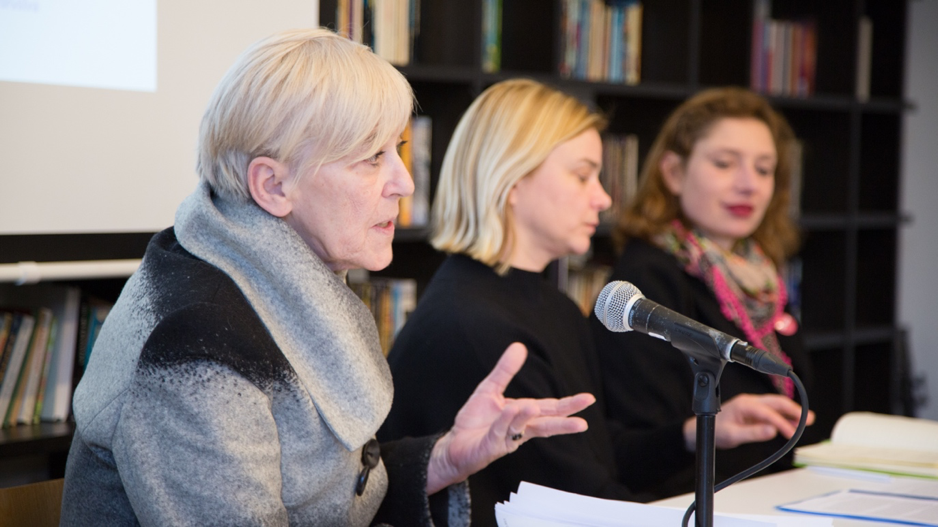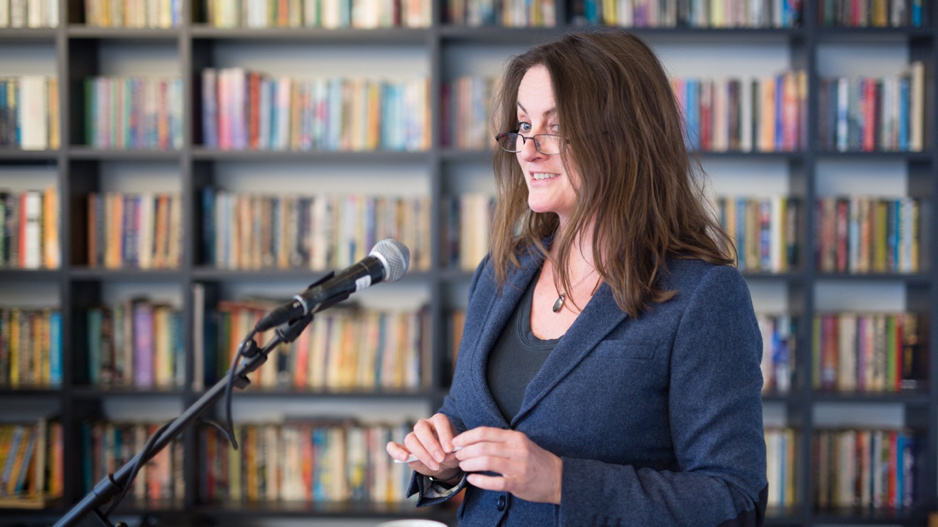This rallying call by Sandra Benčić, Solidarna [Solidarity] Foundation, was among the opening statements at a debate in Oslo, with Croatian human rights defenders from Solidarna, Human rights House Zagreb, and Human Rights House Foundation. Solidarna was founded in 2015 as a platform to mobilise resources and support and build solidarity for human rights in Croatia against current right wing extremism and ultra conservative trends in the country.
Marina Škrabalo, Director of Solidarna, discusses attacks on human rights and the tactics to protect democratic standards in Croatia.
During the debate, Marina Škrabalo described an anti-democratic backlash that manifested in Croatia in the past year [2016], because of a crisis period in which an unstable government was exploited by the right wing.
Marina Škrabalo discusses the work and aims of Solidarna
She warned, “Citizens, public space, and media matter more than ever, yet they have been hijacked by the ultra-conservatives.” These groups have mobilised and employed tools to take over the human rights discourse, promoting traditional values on issues such as women’s rights and sexual health. They have reportedly gained support through linking human rights and the rights of minorities to socioeconomic concerns in the country, raising emotions through nationalist and populist rhetoric, and seeking to control the language of the discourse on human rights.
Sanja Sarnavka, Human Rights House Zagreb, gave the example of the leader of ultraconservative civil society organisation “In the Name of the Family,” Željka Markić, who speaks of human rights as an imposed ideology, and discusses gender not in terms of gender equality, but in terms gender ideology, which she expresses as a threat alongside nazism and communism.
Sandra Benčić warned that key sectors, such as education, culture, media, civil society, and foreign policy, have been co-opted by the neo-conservative movement, and while this was at the level of political statements rather than legislation and government control, it nevertheless gives license to hate.
In this context, Sanja Sarnavka expressed that “it took 20 years to establish standards, and now it seems in five minutes we may lose everything.”

Sanja Sarnavka, Human Rights House Zagreb, presenting in Oslo the work of Solidarna
Solidarna aims to respond to these challenges by creating opportunities for citizens to support human rights initiatives, and for those that support human rights to retake the human rights discourse and challenge the recent ultraconservative take-over of the public space in Croatia. Significantly, many of the Solidarna initiatives presented were focused on citizens, the public space, and media.
The approach presented is one of ensuring that human rights are not just seen as small pockets of support for minorities or for women’s rights, nor as niche rights worked on by civil society professionals, but as something that is essential to the dignity of all citizens, and in which all citizens are involved.
These initiatives aim at building solidarity among diverse organisations and citizens to oppose the regressive agenda put forward by ultraconservative groups in the country. Further, through innovative funding and initiatives such as providing pooled materials for protests, they channel support to human rights at the grassroots level, to start-ups and ad-hoc initiatives.
Solidarna explained, at the more strategic level, the need to reconnect citizens with human rights and communicate in a way that the majority understand and care about: to engage the wider citizenry – the silent majority – on socio-econimc rights as well as human rights, communicating in emotional terms and building solidarity around need rather than identity policies.
The need for such citizen involvement was made clear through a narrative on how right wing and ultraconservative groups have successfully mobilised in the country, and how they have, despite being in the minority, overtaken the discourse on human rights and filled the public space, and infiltrated positions in government to push an illiberal agenda.
Marina Škrabalo stated the importance of solidarity as the value, principle, and the tool, explaining: “it is not only the value to survive difficult times, but also the tool to be independent and to be critical on government policies.”
Human Rights House Foundation (HRHF) in partnership with Human Rights House Zagreb, the Polish Helsinki Foundation for Human Rights, and Human Rights House Belgrade are preparing a toolkit for civil society to defend human rights and the rule of law in the face of “illiberal democracy.”
Maria Dahle, Director of HRHF, commented: “Solidarity is also the key value, principle and tool internationally. This debate and sharing of experiences is part of our work identifying trends and patterns in the actions authorities are taking in their moves toward illiberal democracy, and in developing tools and strategies for civil society to respond.”

Maria Dahle, speaking at a discussion with Solidarna and Croatian human rights defenders in Oslo.
Croatia must stand beside civil society at United Nations
As Croatia took its place on the UN Human Rights Council in February/March 2017, Croatian human rights defenders raised concerns about the direction of its engagement at the Council.
Solidarna Foundation
Solidarna was founded in 2015 by Croatian human rights defenders as a platform to mobilise resources and support and build solidarity for human rights in Croatia, against current right wing extremism and ultra conservative trends in the country.





